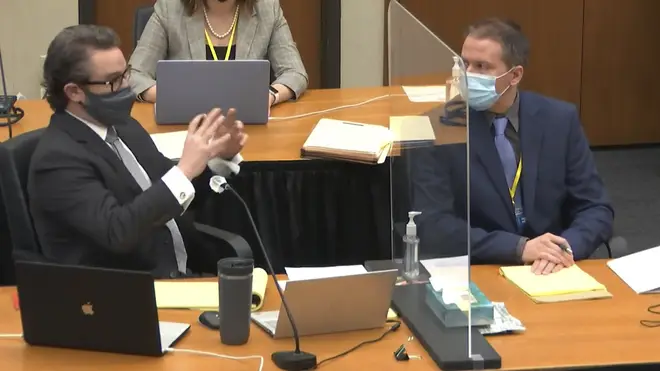
Nick Ferrari 7am - 10am
13 April 2021, 17:04

Moments after the prosecution rested its case against Derek Chauvin after 11 days of evidence, the defence put on its first witness.
The defence has begun its case at the murder trial of former Minneapolis police officer Derek Chauvin, who is accused over the death of George Floyd.
Chauvin’s lawyers seized on a 2019 confrontation between police and Mr Floyd in which the 46-year-old suffered dangerously high blood pressure and confessed to heavy use of opioid painkillers.
Lawyer Eric Nelson has argued that the now-fired white officer did what he was trained to do and that Mr Floyd died last May because of his illegal drug use and underlying health conditions, not because of Chauvin pinning him to the pavement.
Moments after the prosecution rested its case on Tuesday after 11 days of testimony and a mountain of video evidence, the defence put on its first witness.

Retired Minneapolis police officer Scott Creighton gave evidence about a May 6 2019 incident in which Mr Floyd was arrested, a year before his fatal encounter with Chauvin.
Mr Creighton said he drew his gun when Mr Floyd, who was a passenger in the car, did not comply with orders to show his hands.
Mr Nelson played body-camera video that showed Mr Creighton approaching the vehicle on the passenger side, drawing his gun and pulling him out of the car.
Chauvin’s lawyer twice asked questions aimed at getting the jury thinking about Mr Floyd swallowing drugs, but Mr Creighton said he did not see Mr Floyd take anything.
Another witness who responded to that call, retired paramedic Michelle Moseng, said that Mr Floyd told her he had been taking multiple opioids about every 20 minutes.
“I asked him why and he said it was because he was addicted,” said Ms Moseng, who also described Mr Floyd’s behaviour as “elevated and agitated” before the judge struck that remark from the record.
Ms Moseng also said she recommended taking Mr Floyd to hospital based on his high blood pressure, which she measured at 216 over 160, but he resisted.
Under cross-examination by prosecutor Erin Eldridge, Ms Moseng said that Mr Floyd’s respiratory output, pulse, heart rate, EKG and heart rhythms were normal.

Ms Eldridge said Mr Floyd was taken to hospital and released two hours later.
She also made a point of noting that officers gave Mr Floyd contradictory commands, with Mr Creighton telling him to put his hands on the dashboard and another officer telling him to put his hands on his head.
Ms Eldridge noted that another officer threatened to use a stun gun on him, while Mr Floyd asked not to be shot or beaten up.
Judge Peter Cahill cautioned jurors that the evidence from the earlier stop was only for the limited purpose of showing the effects that ingesting opioids might have had on Mr Floyd – and that they were not to use it to judge Mr Floyd’s character.
During the prosecution side of the case, the wrenching video of Mr Floyd gasping for air was played for the jury along with other bystander footage and police body-camera video of the black man’s slow-motion death.
Law enforcement experts and veteran Minneapolis police officials, including the police chief himself, said that Chauvin’s knee on Mr Floyd’s neck for as much as nine-and-a-half minutes was excessive and contrary to his training and departmental policy.
And medical experts said that Mr Floyd died of lack of oxygen because his breathing was constricted as police held him down on his stomach, his hands cuffed behind his back and his face jammed against the ground.
The experts rejected the notion that his drug use or heart condition caused his death.

Mr Nelson has not said whether Chauvin will give evidence.
Such a move could open him up to devastating cross-examination but could also give the jury the opportunity to see any remorse or sympathy on the officer’s part.